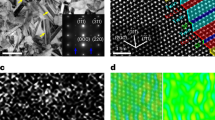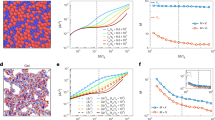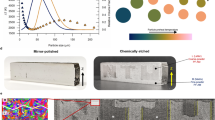Abstract
IN the course of an investigation on the behaviour of aluminium (purity 99·998 per cent) after the release of compressional stress to which it had been subjected, it was found that immediately after compression, the lattice parameter was increased, but that in course of time it decreased according to an exponential law, finally reaching a value at room temperature which was higher than the equilibrium value. The rate of recovery increased as the amount of cold work, measured by the percentage reduction in thickness, increased ; but the final constant value reached was the same for all the compressions investigated. On annealing the material for a suitable period after it had reached the ‘metastable' state, the lattice parameter decreased from the metastable to the true equilibrium value.
This is a preview of subscription content, access via your institution
Access options
Subscribe to this journal
Receive 51 print issues and online access
$199.00 per year
only $3.90 per issue
Buy this article
- Purchase on Springer Link
- Instant access to full article PDF
Prices may be subject to local taxes which are calculated during checkout
Similar content being viewed by others
Author information
Authors and Affiliations
Rights and permissions
About this article
Cite this article
OWEN, E., LIU, Y. & MORRIS, D. Stressed Aluminium. Nature 161, 681–682 (1948). https://doi.org/10.1038/161681b0
Issue Date:
DOI: https://doi.org/10.1038/161681b0
Comments
By submitting a comment you agree to abide by our Terms and Community Guidelines. If you find something abusive or that does not comply with our terms or guidelines please flag it as inappropriate.



